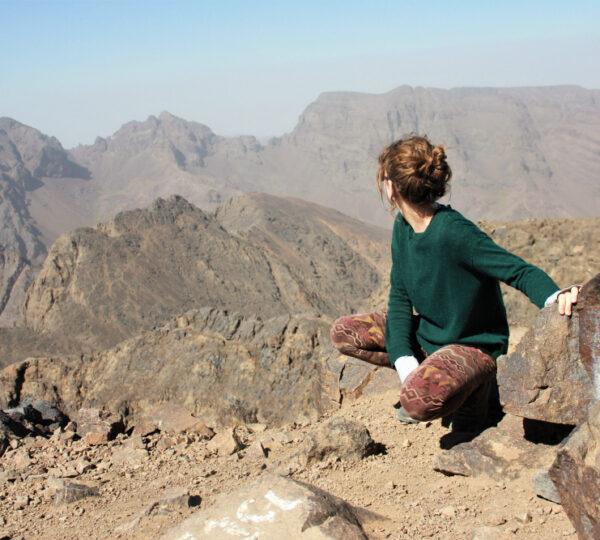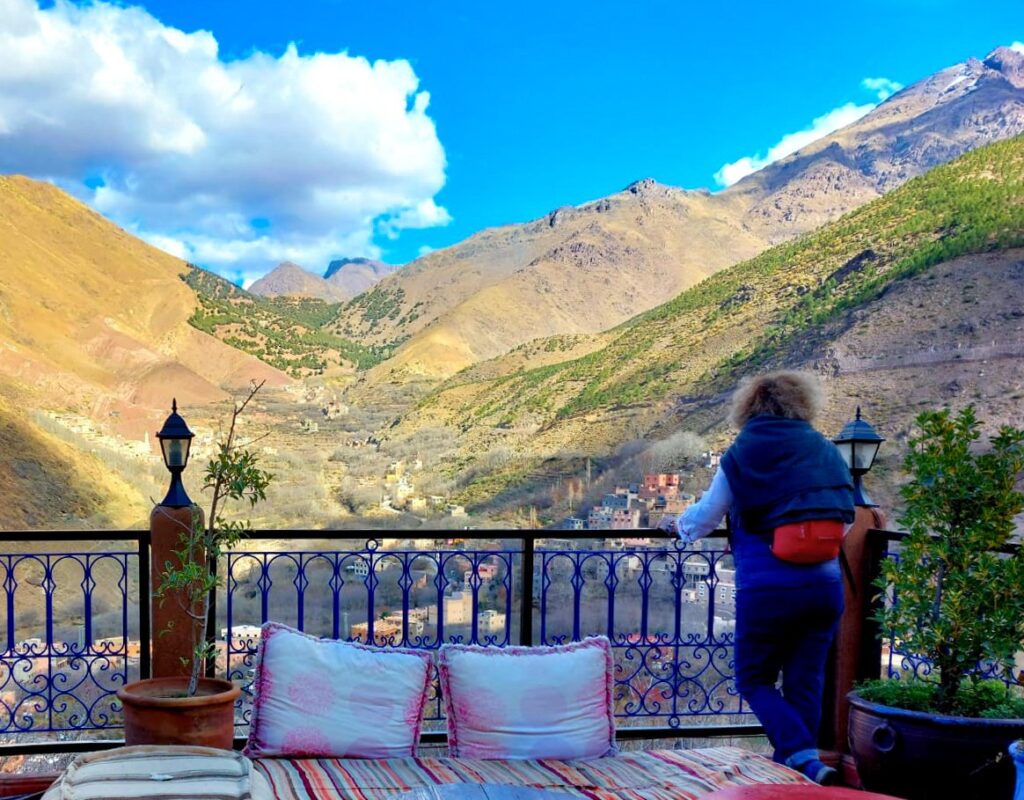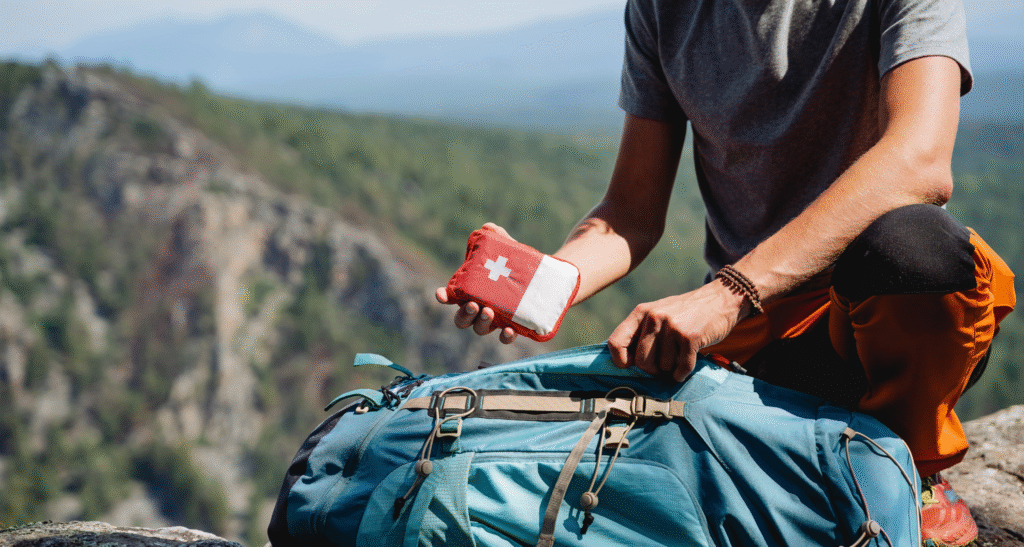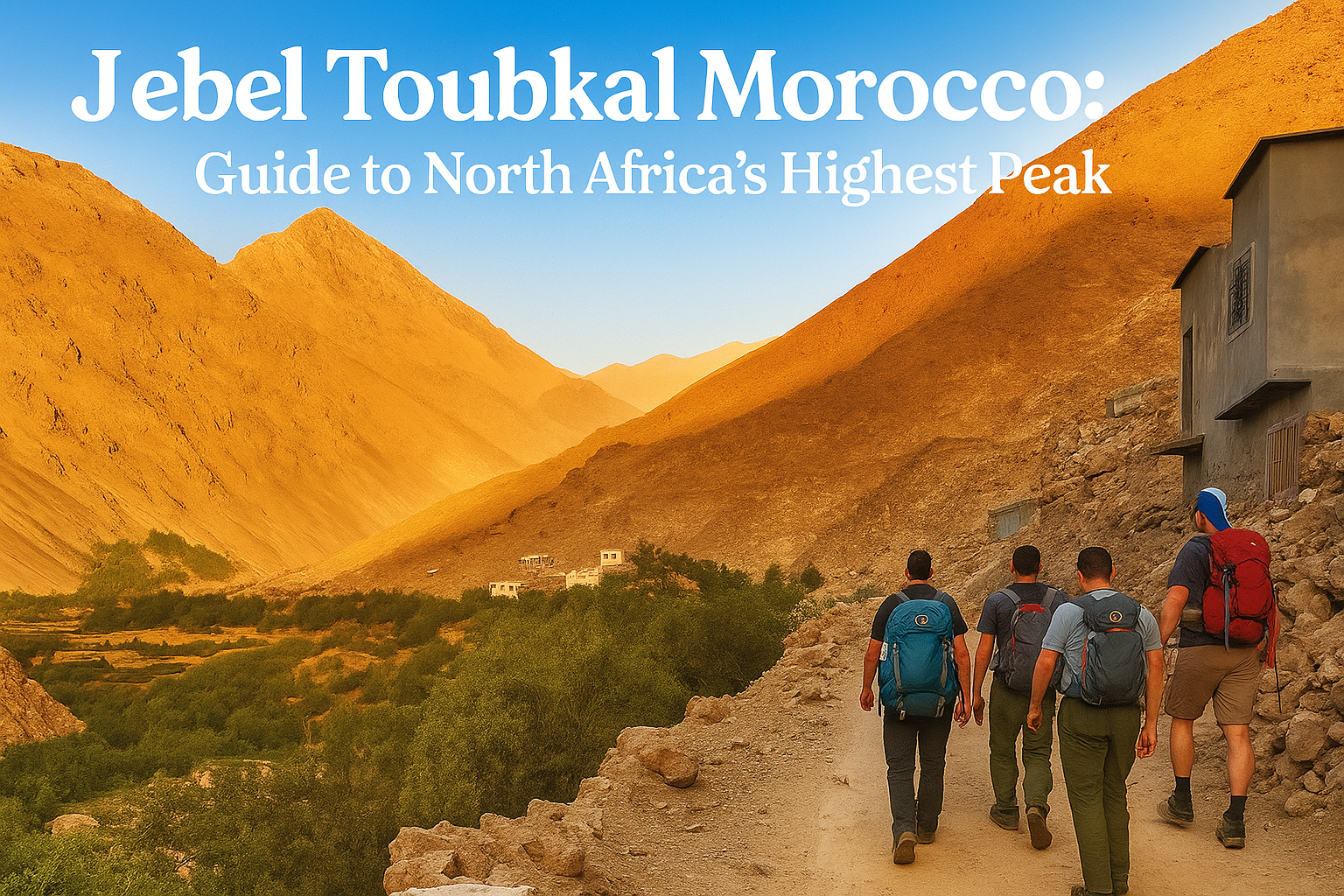Jebel Toubkal Morocco: Guide to North Africa’s Highest Peak
Jebel Toubkal Morocco is a name that echoes with adventure. Rising to 4,167 meters (13,671 feet), it proudly holds the crown as the highest peak not just in Morocco, but in the entire North African continent. Nestled deep in the rugged Atlas Mountains, this majestic summit—often called Mount Toubkal Morocco—is the heart of Toubkal National Park Morocco, a sanctuary of rare biodiversity and breathtaking alpine scenery.
For trekkers and nature lovers, Jebel Toubkal Morocco represents far more than a geographical landmark. It is a journey of discovery, where every step unveils changing landscapes and cultural encounters. Picture yourself crossing verdant valleys dotted with Amazigh villages, pausing at the sacred shrine of Sidi Chamharouch, and pushing higher until the Monte Atlas giant reveals sweeping views over snow-dusted ridges and the endless plains beyond. The classic Mount Toubkal trek offers that perfect blend of challenge, beauty, and cultural immersion.
This guide to Jebel Toubkal Morocco is designed to be your complete roadmap. You’ll find everything you need: the best time to hike, how to reach Imlil, where to stay, and what to pack. We’ll walk through essential itineraries, explain the legal requirement for guides, and offer insider tips on preparation, safety, and budgeting. Whether you’re a seasoned hiker or taking on your very first high-altitude trek, this resource will prepare you for an unforgettable adventure in the heart of the Atlas Mountains Toubkal.
When is the Best Time to Hike Jebel Toubkal Morocco?
Choosing the right season for your adventure up Jebel Toubkal Morocco is crucial for safety and enjoyment. The most popular hiking window runs from April through October, when trails are generally clear of snow and the weather is stable. Within this period, May and June stand out as particularly rewarding months—spring brings mild temperatures, alpine wildflowers, and snow-free higher paths, while autumn (September–October) offers crisp air, clear skies, and quieter trails compared to the busy summer months.

For thrill-seekers, winter ascents from November to April turn Mount Toubkal Morocco into a true alpine challenge. The landscape becomes a snow-clad wilderness, demanding crampons, ice axes, and professional guidance. Shorter daylight hours, freezing winds, and avalanche risks make it suitable only for well-prepared climbers.
The shoulder seasons—late October and early spring—strike a balance between adventure and comfort, with manageable conditions and fewer tourists, though lingering snow may appear. By contrast, mid-summer (July–August) can bring scorching valley heat and sudden thunderstorms, making the trek more taxing despite the popularity of the season. Deep winter (December–January), when snow is at its heaviest, poses the highest risks and should only be attempted by experienced mountaineers with proper support.
👉 Ultimately, the best time to tackle the Atlas Mountains Toubkal depends on whether you seek comfort, cultural encounters, or high-adrenaline winter adventure.
Getting to Jebel Toubkal Morocco: Your Journey to Imlil
Your Jebel Toubkal Morocco adventure almost always begins in the picturesque village of Imlil, the essential gateway to the High Atlas Mountains. At an elevation of about 1,740 meters, Imlil serves as the main launchpad for treks into Toubkal National Park. Thanks to its proximity to Marrakech, the journey from the city takes just 75 to 90 minutes by road, making access both simple and convenient.
Travelers heading to Jebel Toubkal Morocco can choose from several transport options:
- Shared/Grand Taxi: The most popular and budget-friendly method is taking a shared grand taxi from Marrakech’s Bab Doukkala taxi rank. You’ll travel alongside other adventurers bound for the mountains. Seats typically cost around 30 dirhams, while a private ride for the entire vehicle is about 200 dirhams.
- Bus + Taxi Combination: For those seeking a cheaper option, buses from Marrakech to towns like Asni or Tahnaout connect easily to local taxis for the final stretch up to Imlil.
- Private Car or Organized Transport: Many trekking operators include transfers directly from Marrakech hotels. Alternatively, booking a private taxi or car service provides added comfort and flexibility before starting your climb.
While Imlil remains the most practical hub with shops, cafes, guesthouses, and access to guides, the nearby village of Aroumd offers a quieter atmosphere. Perched higher on the valley side, Aroumd rewards visitors with panoramic mountain views and a more traditional Moroccan feel, though amenities are fewer. Whether you stay in Imlil for convenience or Aroumd for authenticity, both serve as excellent starting points for organizing your Jebel Toubkal Morocco trekking experience.
Where to Stay for Jebel Toubkal Morocco: Imlil, Aroumd, and Mountain Refuges
Accommodation options for your Jebel Toubkal Morocco trek are diverse, catering to every budget and preference — from comfortable village lodges to rustic mountain refuges high in the Atlas peaks.

Before and after your climb, the village of Imlil offers a wide variety of guesthouses and small riads. Well-loved choices include Dar Assarou – Toubkal National Park Lodge, Riad Atlas 4 Seasons, and Atlas Prestige. These stays provide cozy rooms, hearty home-cooked meals, and authentic Berber hospitality, making Imlil the ideal base for your Jebel Toubkal Morocco adventure. For travelers drawn to a quieter escape, the nearby village of Aroumd presents beautiful lodges like Kasbah du Toubkal, where you can enjoy breathtaking views and a more secluded mountain atmosphere.
During the trek itself, the standard overnight stop is at one of the refuges located around 3,200 meters. These are crucial for acclimatization and rest before your summit attempt:
- Refuge du Toubkal: The original and larger refuge with basic but functional facilities, usually offering dormitory-style bunk beds. Trekkers need their own sleeping bags, and meals (dinner and breakfast) are available on-site.
- Les Mouflons: Often seen as slightly more comfortable and better maintained, this refuge offers dormitory rooms, sometimes private rooms with en-suite facilities, hot showers (occasionally with a small fee), and a restaurant. Many reviews highlight its cleanliness and welcoming staff.
Booking your refuge in advance, particularly in peak season, is highly recommended. Many guides and tour operators include this as part of their trek packages. Staying in a refuge is a communal and rustic experience, a defining element of the Jebel Toubkal Morocco journey, where hikers from across the globe gather, share stories, and prepare for the climb to North Africa’s highest peak.
The Jebel Toubkal Morocco Trek: A Detailed 2-Day Itinerary
The classic Jebel Toubkal Morocco trek is usually completed in two demanding yet rewarding days, offering the perfect balance between challenge and accessibility for adventurous hikers.
Day One: Imlil to Refuge (Approx. 4–6 hours hiking)
Your Jebel Toubkal Morocco adventure begins in the lively village of Imlil (1,740m). After meeting your guide and muleteer (if you’re using a mule for luggage), the trek sets off along the scenic Mizane Valley. The path gradually ascends through the traditional village of Aroumd, where you’ll enjoy sweeping views back over Imlil and the valley below. From there, the trail continues past streams and rocky slopes until reaching a police checkpoint where your guide’s permit is verified. A cultural and spiritual highlight is the stop at Sidi Chamharouch shrine, a sacred site nestled beside a rushing waterfall, often serving as the perfect lunch spot. Energized, you’ll tackle the steeper sections that climb into the high valley of Toubkal National Park, eventually reaching the refuge at 3,200m. Here, trekkers rest, share stories, and prepare for the all-important summit push with dinner and plenty of hydration to support acclimatization.
Day Two: Refuge to Summit and Descent (Approx. 8–10 hours total)
Summit day on Jebel Toubkal Morocco starts before dawn, usually at 4–5 AM, to make the most of stable morning conditions. With headlamps lighting the way, you’ll ascend steep rocky terrain before tackling the long scree slope leading to the “Tizi n’Toubkal” pass. The final stretch is a relentless but non-technical climb that demands stamina and determination. Standing at the summit (4,167m), you’ll be rewarded with jaw-dropping 360° views of the Atlas Mountains, stretching from snow-dusted peaks to the distant Sahara — an achievement you’ll never forget. After soaking in the panorama, the descent begins. Though easier than the climb, the downhill journey can be hard on the knees and requires caution. You’ll pass back through the refuge to collect your gear before retracing your steps to Imlil, where transport awaits to return you to Marrakech and conclude your trek.
Alternative Itineraries
For those seeking different challenges, other options exist. Ultra-fit hikers sometimes attempt a 1-day ascent, but this is discouraged due to altitude sickness risks. Multi-day treks (3–5 days) are more popular, allowing time to explore side valleys, improve acclimatization, and enjoy a gentler pace. In winter, Jebel Toubkal Morocco transforms into a technical mountaineering experience, requiring crampons, ice axes, and advanced preparation — an exhilarating option for seasoned climbers.
Do You Need a Guide for Jebel Toubkal Morocco?
The answer is a clear yes. Since 2019, Moroccan law requires that all trekkers in Toubkal National Park Morocco be accompanied by a registered local guide. This regulation was introduced following a tragic incident, aiming to enhance safety and improve management of the park.
Hiring a guide for your Jebel Toubkal Morocco trek is far more than a legal formality — it transforms your experience. A knowledgeable guide ensures your safety on sometimes challenging trails, navigates the route efficiently, and handles all logistics, from booking mountain refuges to managing police checkpoints and arranging mules for your gear. Beyond logistics, your guide shares priceless local insight into Berber culture, history, and the natural environment, enriching your journey and creating a more meaningful connection to the Atlas Mountains. They are also trained to recognize signs of altitude sickness and respond appropriately, giving you peace of mind on the ascent.
Booking a guide is simple. You can arrange one through your Imlil accommodation, visit a certified guide office in the village, or book a complete package (including transport, guide, mule, and refuge) with a reputable tour operator based in Marrakech or online. Daily rates for a certified guide typically range from 400–500 Moroccan Dirhams (approx. 40–50 USD/EUR), while standard 2-day trek packages usually cost €115–€190 per person, covering the essential services. Always confirm that your guide is officially registered to ensure safety and compliance.
Essential Packing List for Your Jebel Toubkal Morocco Trek
Packing wisely is a cornerstone for a successful and comfortable Jebel Toubkal Morocco trek. Weather in the Atlas Mountains can change rapidly, and you’ll need to carry everything necessary for two days — unless you opt for a mule to transport your main bag.
Must-Have Items:
- High-quality, broken-in waterproof hiking boots with ankle support.
- A reliable headlamp with extra batteries, essential for the pre-dawn summit push.
- Passport, required for police checkpoints in Toubkal National Park Morocco.
- Sufficient cash in Moroccan Dirhams for guide fees, refuge meals, tips, and snacks, as ATMs are unavailable in Imlil or on the mountain.
- Refillable water bottle or hydration system, ideally 2–3 liters capacity.
Clothing (Layering is Key!):
- Base Layers: Moisture-wicking thermal tops and leggings.
- Mid Layers: Fleece or insulated jackets for warmth; a down jacket is highly recommended even in summer for the summit.
- Outer Shell: Waterproof and windproof jacket and trousers.
- Trekking Trousers: Lightweight, quick-drying, and durable.
- Head & Hands: Warm hat, sun hat with neck cover, buff, sunglasses (Category 4 for snow), liner gloves plus warmer, waterproof gloves for winter or early mornings.
- Cultural Consideration: While hiking, standard trekking attire is fine. In villages like Imlil, dressing modestly (covering shoulders and knees) is respectful.
Gear:
- Sleeping bag rated for sub-zero temperatures, as mountain refuges can get very cold.
- Hiking poles to reduce strain on knees, especially during descent.
- Daypack (20–30 liters) for essentials during the hike.
- Duffel bag (40–50 liters) for mule transport (if using one).
- Winter-Specific Gear: Crampons and ice axe for safe travel on snow and ice.
Other Essentials:
- High-energy snacks (nuts, chocolate, energy bars).
- Basic first-aid kit, including blister plasters, painkillers, and personal medications.
- Toiletries, including toilet paper and hand sanitizer, as refuge facilities are basic.
- Sunscreen and lip balm with high SPF.
- Basic navigation tools: map and compass, or GPS apps like Maps.me, though your guide will lead the way.
Proper preparation ensures a safer and more enjoyable Jebel Toubkal Morocco trek, allowing you to focus on the breathtaking scenery, cultural encounters, and the ultimate achievement of reaching North Africa’s highest peak.
Overcoming Challenges & Preparing for the Jebel Toubkal Morocco Ascent
The Jebel Toubkal Morocco trek is a physically demanding adventure, but with proper preparation, it is achievable for most fit individuals. Key challenges include altitude, rugged terrain, unpredictable weather, and mental endurance.
Physical Preparation:
Start training 2–3 months in advance. Focus on cardiovascular endurance through running, cycling, or swimming, complemented by strength training for your legs and core. The most effective training, however, is hiking itself — especially on hills or stairs with a weighted backpack to simulate the conditions of the Mount Toubkal trek.
Mental Preparation:
Summit day begins early, often in complete darkness. Maintaining a positive mindset and steady motivation is essential. Break the ascent into manageable segments, focusing on each step at a time, and remind yourself of your personal “why” for taking on this challenge.
Altitude Sickness:
Reaching 4,167 meters carries the risk of Acute Mountain Sickness (AMS). Symptoms may include headache, nausea, dizziness, and fatigue. Prevention is critical: ascend gradually, drink plenty of water (aim for 3+ liters daily), avoid alcohol, and consume carbohydrate-rich meals. The standard 2-day itinerary provides some acclimatization at the refuge, but arriving in Imlil a day early for a short acclimatization hike can significantly improve comfort and safety. Always listen to your body and inform your guide immediately if you feel unwell — descending remains the primary treatment.
Terrain and Weather:
Trails in Toubkal National Park Morocco include rocky paths, scree slopes, and occasional snowfields. Weather can change rapidly, from blazing sun to cold winds or sudden rain and snow. Being prepared for all conditions and trusting your guide’s judgment is essential for a safe trek.
Coping with Crowded Refuges:
During peak season, mountain refuges can become very busy. Bring earplugs for sleeping, remain patient, and embrace the communal atmosphere. Booking in advance is highly recommended to secure your spot and ensure a smooth overnight stay.
With thoughtful physical and mental preparation, proper acclimatization, and awareness of trail conditions, your Jebel Toubkal Morocco trek can become a safe, rewarding, and unforgettable adventure.
Cultural Immersion & Spiritual Stops on Your Jebel Toubkal Morocco Trek
A trek in Jebel Toubkal Morocco is as much a cultural journey as it is a physical challenge. The High Atlas Mountains are the heartland of the Amazigh (Berber) people, who have lived here for millennia. Their unique culture, language (Tamazight), and traditions are deeply intertwined with the rugged landscape of Toubkal National Park Morocco.
Engaging with local guides, muleteers, and villagers in Imlil and Aroumd offers a genuine window into Amazigh life. You’ll experience their legendary hospitality and resilience firsthand. Learning a few simple phrases in Amazigh or Arabic, such as “Shukran” (Thank you) or “Salam alaykum” (Peace be upon you), is always appreciated and helps foster connection.
A standout cultural and spiritual highlight along the trail is the Sidi Chamharouch shrine. Situated beside a waterfall at around 2,300 meters, this site serves as a place of pilgrimage for local Muslims. It is dedicated to a marabout (holy man) and is believed by some to be linked to pre-Islamic traditions, often referred to as the “King of Jinns.” The shrine, marked by a distinctive white-painted boulder, exudes tranquility and reverence. Trekkers frequently pause here to rest, admire the scenery, and observe pilgrims paying their respects. This stop is a profound reminder of the deep spiritual and cultural connection the local Amazigh communities have with the Mount Toubkal Morocco landscape.
Beyond Toubkal: Other Hikes in the Imlil Area
While Jebel Toubkal Morocco is undoubtedly the star attraction, the surrounding Toubkal National Park Morocco and the wider Atlas Mountains offer a wealth of other incredible hiking opportunities. These trails are perfect for acclimatization, rest days, or extended trekking adventures.
Short Acclimatization Hikes (from Imlil/Aroumd):
- Radio Tower Hike: A relatively easy 2–3 hour round trip from Imlil to a viewpoint with panoramic vistas.
- Waterfall Walks: Several scenic trails lead to cascading waterfalls along the valley sides, ideal for a refreshing break.
- Sidi Chamharouch Visit: A half-day hike to this shrine allows you to test your legs and experience part of the trail without committing to the full summit ascent.
Longer Loops and Treks:
- Tizi n’Tamatert & Tizi n’Mzik: High mountain passes offering stunning views and connecting different valleys; often incorporated into multi-day treks.
- Aguersioual Loop: A beautiful multi-day trek through remote valleys and traditional Amazigh villages.
- Exploring the Imlil Valley: Wander the network of paths around Imlil and Aroumd to discover terraced fields, walnut groves, and charming hamlets.
Other Peaks and Ranges:
For those eager to explore beyond the Monte Atlas giant, Morocco offers more. The M’Goun Massif, further east, features the country’s second-highest peak and spectacular, less-trodden trekking routes. Meanwhile, the Anti-Atlas Mountains near Tafraout provide a strikingly different, arid, and dramatic landscape for adventure. These areas highlight the incredible diversity of Morocco mountain terrain beyond Mount Toubkal Morocco.
Safety and Essential Logistics
Is hiking Mount Toubkal safe? Generally, yes — when undertaken with proper preparation and a registered guide. The trails are well-marked, and the mandatory guide system enhances safety through their local expertise and emergency response skills. Police checkpoints along the route further contribute to overall security.

Travel Insurance: Non-negotiable. Make sure your policy explicitly covers high-altitude trekking up to 4,167 meters and includes emergency medical evacuation. Providers such as World Nomads or specialized adventure travel insurers are recommended. Always verify coverage before departure.
Emergency Services and Communication: Mobile signals are patchy on the mountain. Your guide serves as your primary link in emergencies, trained to administer first aid and contact rescue services. While rescue operations exist, response times can be slow in remote areas, emphasizing the importance of preparation and having a guide.
Considerations During Ramadan: If your trek coincides with Ramadan, be respectful. Guides and muleteers may be fasting from dawn to dusk, and refuge meals might be served later in the evening. Avoid eating, drinking, or smoking in public during daylight hours. Village services may also operate on reduced schedules.
Costs and Budgeting for Your Toubkal Adventure
Budgeting for a Mount Toubkal Morocco trek involves several components. A reasonable estimate for the core 2-day trek (excluding international flights, personal gear, and discretionary spending) is €115–€190 per person.
Breakdown:
- Transport (Marrakech to Imlil): Shared taxi: ~30–50 MAD per person; Private taxi: ~200–300 MAD total; Organized transfers often included in packages.
- Guide Fees: Approximately 400–500 MAD per day, totaling 800–1,000 MAD for the 2-day trek. Many operators bundle this with other services in a package.
- Package Examples: All-inclusive 2-day packages (transport, guide, mule, refuge, meals) typically range from $120–$215 per person.
- Refuge Stays & Meals: Dormitory bed: ~150–250 MAD per night; Dinner and breakfast extra, around 100–150 MAD each.
- Gear Rental in Imlil: Boots: ~50–100 MAD/day; Sleeping bag: ~50 MAD/day; Trekking poles: 30–50 MAD/day; Winter gear (crampons, ice axes) costs more.
- Mule Hire: To carry your duffel (up to 15kg), budget ~200–300 MAD for the 2-day trek.
- Snacks, Drinks, Tips: Allocate ~100–200 MAD/day for water, snacks, soft drinks, and tipping your guide and muleteer (customary and appreciated).
Proper planning and budgeting ensure a smooth and enjoyable Mount Toubkal trek, allowing you to focus on the adventure, landscapes, and cultural immersion without worrying about logistics.
Post-Hike Relaxation: What to Do After Toubkal
After the physical exertion of the Mount Toubkal Morocco trek, your body and mind deserve proper recovery and relaxation—you’ve truly earned it!
Rest Days in Imlil: Consider extending your stay for an extra night or two in Imlil or Aroumd. Breathe in the crisp mountain air, savor leisurely mint tea on a terrace with panoramic views, indulge in a traditional hammam (steam bath), or take gentle strolls around the village without carrying a heavy pack. Many lodges offer massages, providing the perfect way to soothe tired muscles after the ascent.
Returning to Marrakech: The vibrant energy of Marrakech is a striking contrast to the serene heights of Toubkal. Treat yourself to a luxurious riad stay, explore the bustling souks, relax in a café at Jemaa el-Fna square, and enjoy mouthwatering Moroccan cuisine. This city offers an ideal setting to celebrate completing your jebel toubkal morocco adventure.
Coastal Escape to Essaouira: For a refreshing change of pace, head to the Atlantic coast. The charming town of Essaouira, with its fortified medina, fresh seafood, and breezy beaches, is perfect for post-trek relaxation. The drive from Marrakech takes approximately 2.5–3 hours. Combining the mountain air with the sea breeze offers a memorable and rejuvenating conclusion to your Moroccan journey.
Frequently Asked Questions About Hiking Mount Toubkal
How high is Mount Toubkal? At 4,167 meters (13,671 feet), Jebel Toubkal Morocco is the highest peak in North Africa.
How long does the trek take? The standard ascent is a 2-day trek, though 3–4 day itineraries are recommended for better acclimatization. Multi-day circuits are also available for those seeking a slower pace.
Is it a technical climb? No. During the summer months (June–September), the Mount Toubkal trek is non-technical, requiring good fitness and stamina but no climbing skills or ropes. Winter ascents, however, require mountaineering experience and specialized equipment.
Do I need special winter gear? Absolutely. For winter climbs (November–April), crampons, an ice axe, and appropriate cold-weather clothing layers are essential.
Can I hike solo? No. Since 2019, it is a legal requirement to hike with a registered local guide within Toubkal National Park Morocco.
What should I eat? Focus on carbohydrate-rich meals for energy. Refuge dinners usually include hearty tagines or pasta. Bring high-energy snacks like nuts, dried fruit, chocolate, and energy bars, and stay hydrated throughout the trek.
Are there showers at the refuges? Basic shower facilities (often cold or lukewarm) are usually available at refuges such as Les Mouflons, sometimes for a small fee. Don’t expect luxury; it’s about basic refreshment and recovery.
Conclusion: An Unforgettable Moroccan Adventure
Standing atop Jebel Toubkal Morocco, gazing over the vast expanse of the Atlas Mountains, is an experience that imprints itself on your soul. It’s more than reaching the highest point in North Africa—it’s a journey through breathtaking landscapes, a test of endurance, and an immersion into the rich Amazigh culture. The Mount Toubkal trek uniquely blends physical challenge, natural beauty, and cultural authenticity.
From the bustling streets of Marrakech to the serene peaks of the Monte Atlas, and finally to the coastal charm of Essaouira, a jebel toubkal morocco adventure showcases the remarkable diversity of Morocco. The early summit start, steep scree slopes, and thin mountain air are all part of the story, making the triumph at the top and the shared moments in the refuge even more memorable.
If you’re seeking an adventure that pushes your limits while rewarding you with unforgettable memories, Jebel Toubkal Morocco awaits. The paths are ready, the guides are prepared, and the mountains are calling. Don’t just dream—plan your trek today. Lace up your boots, pack your sense of wonder, and conquer North Africa’s rooftop!
Share Your Experience: Have you summited Mount Toubkal? Leave your tips, experiences, or questions in the comments to help fellow adventurers explore Toubkal National Park Morocco.



